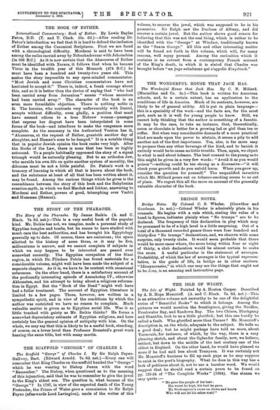THE BOOK OF ESTHER.
International Commentary : Book of Esther. By Lewis Bayles Paton, D.D. (T. and T. Clark. 10s. 6d.)—After reading Dr. Paton's introduction we feel that it is hard to defend the inclusion of Esther among the Canonical Scriptures. First we are faced with a chronological difficulty. Mordecai is said to have been among the exiles carried away by Nebuchadrezzar with Jehoiachim (in 596 B.C.) As it is now certain that the Ahasuerus of Esther must be identified with Xerxes, it follows that when he became Vizier in the twelfth year of this Monarch (474 B.C.) he must have been a hundred and twenty-two years old. This makes the story impossible to any open-minded commentator. "Most Jewish and some Christian commentators have not hesitated to accept it." There is, indeed, a frank courage about this, and so it is better than the device of saying that "who had been carried away from Jerusalem" means "whose ancestors had been carried away." The character of the book is an even more formidable objection. There is nothing noble in it. The heroine, who contrasts very unfavourably with Daniel, accepts without difficulty, even gladly, a position that must have seemed odious to a true Hebrew woman—passages that express her disgust have been interpolated in some forms of the book—and interferes to make the vengeance more complete. As the summary in the Authorised Version has it, "Ahasuerus, at the request of Esther, granteth another day of slaughter, and Haman's sons to be hanged." It is a notable thing that in popular Jewish opinion the book ranks very high. After the Books of the Law, there is none that has been so highly esteemed. To a people habitually oppressed the story of a signal triumph would be naturally pleasing. But to an orthodox Jew, who moulds his own life on quite another system of morality, the dilemma must be not a little painful. Dr. Paton's work is a treasury of learning in which all that is known about the book, and the substance at least of all that has been written about it, may be found. Among the curious things which he gives is the resemblance between the story of this book and the Babylonian creation-myth, in which we find lilarduk and Ishhar, answering to Mordecai and Esther, powers of good, triumphing over Vashti and Humman (Haman).






































































 Previous page
Previous page